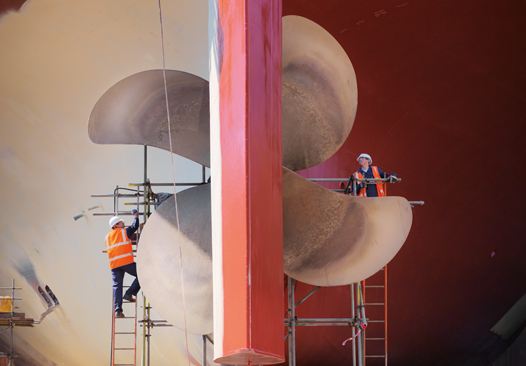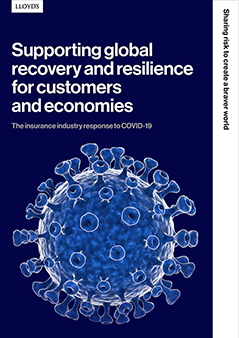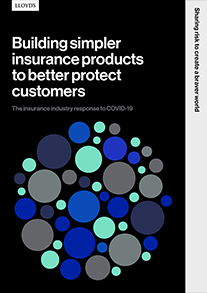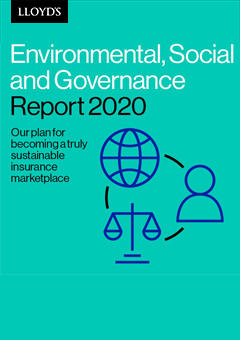As we look back at 2020, we can all be proud of the way in which Lloyd’s has stood up and demonstrated its strength and resilience during one of the most challenging times in living memory. Throughout its 330-year history, Lloyd’s has provided help when it is needed most, and we did so yet again as the impacts of the health crisis inflicted enormous social and economic devastation globally.
We started this year with three main priorities: to continue our progress on returning to sound and market leading underwriting performance; to implement our Future at Lloyd’s strategy for the long-term success of the market; and to build a diverse and inclusive culture. And whilst priorities had to be shifted to respond to the impacts of COVID-19, we have made distinct and tangible progress against each of them.


Looking ahead to 2021, it is clear that our purpose of sharing risk to create a braver world has never been more important. That is why we are placing purpose as our fourth strategic pillar, alongside performance, digitalisation and culture. Fundamentally it means ensuring our market is set up for long term sustainability, that we continue to innovate new products and services that are valued by our customers, and that we continue to build the trust of our customers who rely on us to be there in their time of greatest need.
We expect to pay out £6.2bn in claims to support those impacted by the pandemic, mostly within event cancellation, property and casualty classes of business.
The insurance industry has a vital role to play in protecting society by providing security and confidence in the form of risk mitigation and insurance that allows businesses and communities to innovate, develop and drive economic growth, as well as enabling quick recovery from disasters by paying claims for the insurable elements of systemic risk.
While the societal and economic impacts of the pandemic are of a scale not previously experienced in our lifetime, it has shown that a hypothetical systemic risk is never far from becoming a reality and that we must do everything we can to prepare and mitigate against the worst impacts of the constantly changing and challenging risk landscape. A large proportion of 2020 was spent focusing on how Lloyd’s responded to COVID-19 and ensuring that we provided the support needed to customers and the insurance market, as well as identifying what steps we could take to mitigate future risks of this kind.


In April, we set up a Corporation Response Team to respond to COVID-19 enquires from both the market and policyholders to ensure we were efficient and consistent in the way we handled the high volume of queries.
2020 also saw the Underwriting Room close for the first time in its history. Following its reopening in September to January, we implemented class of business timetables to manage the number of people in the building and put in new policies and procedures to ensure it is COVID-secure, and we look forward to opening our doors again in May 2021 as restrictions in the UK begin easing.
The ability for our vibrant marketplace to come together, share risk and develop solutions has ensured Lloyd’s has always been at the forefront of innovation. As we continue to adapt to a new landscape, we’re looking at how we create an exciting, bold, and innovative future experience that combines digital and physical, so Lloyd’s continues to be the space to meet, convene, and share risk. We began work on a market-wide consultation to gather insights and ideas from our stakeholders on how we can reshape the Underwriting Room and shared spaces in the Lloyd’s building to help futureproof the market. The consultation is still underway, and we will be sharing information on the outcomes from this in due course.
Insurance industry response to COVID-19: Report series

In July we published our first report in our ‘Insurance industry response to COVID-19 series’. Supporting global recovery and resilience for customers and economies: the insurance response to COVID-19 sets out three proposed ‘open source’ frameworks – ReStart, Recover Re and Black Swan Re – that are freely available for application around the world, two of which require government and (re)insurance industry partnerships. We have actively engaged with over 25 governments about the frameworks, which aim to provide customer protection for further waves of COVID-19 and other future pandemics, as well as strengthening societal resilience against future systemic catastrophic events.

In October we published the second report of the series, Building simpler insurance products to better protect customers. The recommendations set out in our second report address the urgency with which the global insurance industry must invest and focus on clarifying and simplifying its products. Doing so will mean customers have improved understanding of the cover they have in place and the most relevant protection for the risks they face. While product complexity presents a challenge for all customers, the need is particularly pressing for small to medium-size enterprise customers, who make up a substantial proportion of insurance policies sold globally but who typically have significantly less access and resource dedicated to risk management than larger corporate firms.
Charitable efforts
We focused on helping charities respond to the immediate and long-term needs of communities dealing with the impacts of COVID-19 by committing £15m to charitable organisations and funds. We have held the remaining funds in reserve to support future needs relating to the pandemic. So far, the money has helped 197 charities and their beneficiaries. We also worked with our existing partners to develop new virtual volunteering activities and supported them with unrestricted donations to help them adapt during COVID-19.


Building a more sustainable market to support a braver, greener world
17/12/2020
In December, we published our first Environmental, Social and Governance (ESG) report setting out our plans for transitioning to a more sustainable insurance and reinsurance marketplace. It builds on our existing ESG work with a comprehensive market-wide strategy that supports the global transition to net zero and commits the market for the first time to publicly accountable targets for responsible underwriting and investment.
The report outlines the targets we have set for the phasing out of investments and insurance cover for thermal coal-fired power plants, thermal coal mines, oil sands and new Arctic energy exploration activities to help accelerate society’s transition from fossil fuel dependency towards renewable energy sources. It also highlights the ongoing work, commitments and ambitions to support resilient communities globally, and to driving culture change across the Lloyd’s market and industry.
This is the first time we have set an ESG strategy for the Lloyd’s market. It represents an important milestone on the journey towards building a more sustainable future and will enable us to play our part in building back a braver, more resilient world.
Find out more about our targets in our press release
Supporting our European customers

At the end of the year we completed the transfer of EEA policies to Lloyd’s Insurance Company SA (Lloyd’s Europe) following approval from the High Court of England and Wales in November. This monumental programme of work involved a complex and diverse range of stakeholders across the UK and Europe, working together towards the common objective of making sure that Lloyd’s customers remain protected. The successful transfer of this business to Lloyd’s Europe has enabled the continued management and servicing of EEA and issued policies, as well as global policies with EEA exposures, following the end of the transitional period after the UK’s exit from the EU.
Transforming Lloyd’s governance
In November 2019, we announced our intention to form a single governing body by merging the Council and the Franchise Board effective from 1 June 2020. Through the Future at Lloyd’s we are building a new market that is innovative and responsive to the needs of our customers. To do this effectively we needed to make our governance structures as efficient as possible to enable us to deliver on our strategy to build the most advanced insurance marketplace in the world.
By creating a single governing Council, it allowed us to combine robust and accountable governance with the ability to make swift decisions when necessary, something that has been highlighted as particularly important due to the current COVID-19 pandemic. We took careful steps during 2020 to ensure our governance and management of the Lloyd’s market and Corporation was as efficient as possible, while also representative of our different stakeholders.
The elected members of the Council were confirmed in November, effective 1 December 2020.


